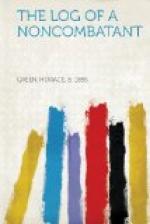I overheard a typical remark when matters were in this critical state. It came from a handsome, curly-headed officer, noticeable not only for his apparent efficiency, but because he didn’t let the game of war interfere with his attentions to the little Princess de Ligne. The latter was nursing her brother, who had been shot through the back of the neck during a raid through German lines. She was a princess in rank, and a queen in looks. Thirty hours before the first shell burst into the Place Verte—Monday morning, it was—this fellow rapped at my door. He had wandered into the wrong pew, for his words were obviously intended to hurry up a brother officer with whom he was to take the morning ride to the firing line. Sticking his curly, sunburnt head around the corner he drawled in inimitable British intonation:-
“I say, old chap, do hurry along; this is no ordinary occasion, you know.”
In the Royal Belgian Palace there happened a few hours before the bombardment an incident revealing the simplicity and kindliness of King Albert’s character. In connection with it, it is necessary to speak of Harold Fowler, a New Yorker and Columbia College graduate, who helped to save the public buildings of Antwerp, and later entered the Allied ranks as a fighter. When the war broke out, Fowler was private secretary to Ambassador Page in London. In November he got a commission in the Royal Horse Guards, known as the “Blues.” While the Germans were pressing hard on Antwerp, the German commander, as I have mentioned elsewhere, asked that a diagram of the city of Antwerp, with plans and location of the cathedral, the Hotel de Ville, and the more important works be sent to him in order that he might find the range and avoid firing on them. Neutrals were to carry the plans through; and Fowler and Hugh Gibson, secretary to the American Minister at Brussels (Brand Whitlock), volunteered.
Two days before the bombardment Gibson went to the Royal Palace at Antwerp where General de Guise and his staff were in conference. Fowler trailed along, but, not liking to enter, walked up and down the hallway, hands in his pockets, admiring the portraits half-hidden in the darkness of the foyer. A tall figure approached and in French asked who he was. Fowler replied that he was an American and was waiting for Gibson.
“I see,” said the figure, then speaking in English, “that you are interested in pictures.”
“Very much,” answered Fowler.
“Then, would you like to see those in the Royal Chambers upstairs?”
Fowler hesitated, feeling like an intruder, but the figure insisted upon leading him upstairs. When they got into the light, Fowler turned to examine his kind friend. To his utter astonishment he saw that it was Albert, King of the Belgians!
By that time we of Antwerp were getting a very fair imitation of a city besieged. Water supply had already been cut off for some days. There was just enough for cooking purposes; bathing and such pleasantries were out of the question—even for Royalty. According to the French maid in my corridor, Winston Churchill managed to get a shave by ordering tea sent to his room and using the hot water for shaving lather.




